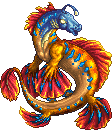Viewing X'Xiwfirpa

Father: Unknown
Unknown Pedigree
Hardiness: 80
Appearance: 5
Emerged: 5:07 07.09.2021
Matured: 9:58 09.09.2021
A prevalent and diverse species of fish, Limaka Cevalos are found throughout the tropical and temperate oceans. Though their main source of food is phytoplankton or seaweed, these opportunistic grazers will consume any vegetation they can find, making them an ecological hazard if their population grows unchecked. During mating season, males will court females with offerings of food, grooming, and spending time with them. Pairs mate for life, and malescarry the eggs in a pouch on their ventral side until the juveniles emerge. Both parents care for the young until they are old enough to survive on their own.
Seasnares, the deep-sea subspecies of Limaka Cevalo, earn their nickname from the bioluminescent lures on their heads and the tips of their tails. These lures are used for hunting, which supplements their diet due to the scarcity of flora in the ocean depths, as well as to confuse predators and locate other Limaka Cevalos. Relatively solitary by nature, Seasnares rarely travel in groups of more than two or three and will often wander solo until they choose a mate. Females tend to be slightly larger than males, though both are rather aggressive toward other aquatic life.
The creatures that dwell in this rather desolate world still display some diversity in appearance, eating habits, and social behavior. Whether they have fur or feathers, skin or scales, their unique genetic makeup allows for a variety of colors and markings within each species. Despite limitations in food sources, herbivores, omnivores, and carnivores are all present in the food chain, and each species requires specialized care within a laboratory. Although the artificial setting of housing units and breeding pods precludes most opportunities to study true interspecific behavior, the interactions within and between species has been studied extensively in the wilderness by scientists daring enough to venture beyond the outpost’s walls.
